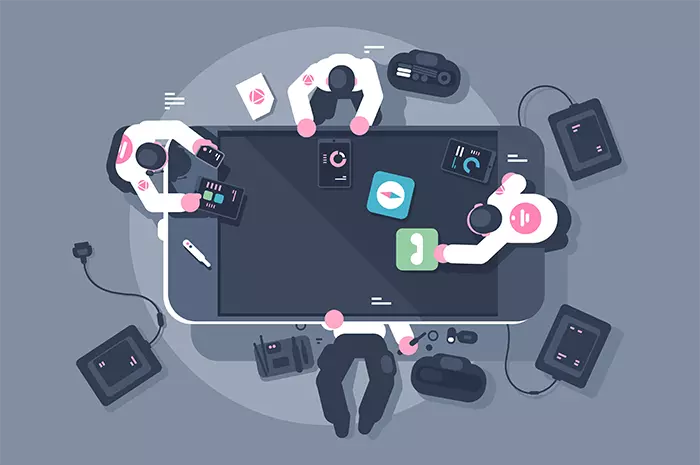Here's a thought-starter for you. Imagine a sage under a 'Bodhi' like a tree, with earphones on, (yes, 'earphones' or you could imagine a headphone, might make a difference) using a meditation app on his mobile to meditate.
I can hear a voice raging in my head – "you might as well put Trump there instead of a sage, 'trying' to meditate, it will have the same effect – hilarious."
Table of Contents:
Before we continue discussion of absolute hilarity, let's focus on meditation. Meditation, the great ancient practice, has found its wings and taken the planet earth by a 'storm', ironically speaking.
Meditation is a 5000 years old practice that is perceived to be a powerful tool for several reasons. It has the ability to improve sleep, decrease anxiety, improve our sense of self, hone your focus and help 'mindfulness' transcend into our daily lives – and these are just a few of those many benefits promised by this exercise.
Ten years ago, when I used to think of the term 'meditation', my spontaneous reaction would be - calm waters, nature, hilltop, peace, silence. This and not another human or an 'electronic device' in sight. I am sure of having read somewhere to turn off/tune out everything (even try not to pay heed to our very own mind fluttering with thoughts) and to just be with/connect with our inner self.
In the last 10 years, we have come a long long way. I can say this with conviction because I am a meditator and I have seen meditation as a practice taking different forms. I remember my yoga guru telling me just a few months ago, "I truly believe that even work is meditation especially if you love what you do". There are various ways in which you can meditate today and there are many different results you can achieve through this exercise.
Only to mention a few - there is meditation for creativity, meditation for kids, meditation to even manifest your dreams. The way we practice meditation has changed too. This is where the meditation applications play a significant role. But the question here is, do they play a significant role? Can they really help you relax?
In a practice where the highest form of 'self' achievement involves digital detox and digital declutter, meditation apps are feverishly trying to work on the latter. It has worked! I don't think they have managed to get Trump to meditate but that is quite an unrealistically far-fetched goal for any business to strategize.
Again, a discussion for another day. Meditation as a practice has become easier with the definition and the essence exploding into more layers. The app owners/creators and app developers have grabbed this opportunity to make the meditation apps more explorative and dimensional.
Here are 3 splendid meditation apps and their success stories that hold the righteous proof that meditation app does work if you are indeed 'willing' to meditate.
Insight Timer:
This app is considered to be the most widespread and sought-after meditation app with its library offering more than 4000 meditation exercises. These meditations are from around at least 1000 and more masters around the globe.
It has a variety of meditation that covers a different kind of topics addressing almost every issue that people face today. There are meditations on forgiveness, sleep, energy clearings et al.
There are different kinds of sounds that can be used for meditation only by setting a timer. One of the unique features of this app is that it gives information on the number of users that are meditating at the very moment with details of what they are meditating too.
It even displays the number of people who have meditated on the present day. This feature gives the users a sense of belongingness and makes them feel more connected to the practice.
Omvana:
Omvana meditation app has been developed by Mindvalley Academy that focuses on personal growth, spirituality, health, fitness, productivity et al. According to their website, it is a hub of three million students, subscribers and followers worldwide. It offers around 1000 guided meditations, again on various subjects, however unlike Insight Timer only about a few of those are free.
It is most popular for its morning meditation which accordingly to the founder of Mindvalley is practiced by about 50,000 meditators around the globe. Though all the meditations are not free and the choices are not as many, it is still considered to be a great app. For those who want an exceptional morning meditation and find an enormous number of choices, such as that in Insight Timer, quite complicated and overwhelming – Omvana is the one.
Calm:
One of the unique features of this app is the sound that starts playing the moment you access the app. This app does not have a huge number of meditation techniques but has this distinctive feature that entails bedtime stories. They offer bedtime stories for adults on every topic from science fiction to scenic landscapes to help one transition into deep sleep. This feature also targets kids as they have bedtime stories for the little angels to swiftly escape to their dreamland.
So, it can be said without a doubt, that digital options for meditation are pretty helpful. Especially, with the option to meditate anywhere, anytime – it's a genius invention. You don't need to be in a monastery or on a hill top to achieve the desired result – you can meditate at your office desk, in your car (as long as you are not driving of course!) or on a train. It works.
If you have a unique idea for a meditation app, connect with BluEnt. We can assist you in developing a meditation app that can help your meditators get substantial benefits from this application in all kinds of ways.
Maximum Value. Achieved.



 How Much Does App Development Cost? A Budget Estimation Guide
How Much Does App Development Cost? A Budget Estimation Guide  Using Angular to Develop Mobile Apps Can Be a Game Changer for Your Business
Using Angular to Develop Mobile Apps Can Be a Game Changer for Your Business  Pros and Cons of the WooCommerce Plugin for Online Merchants
Pros and Cons of the WooCommerce Plugin for Online Merchants  Mean Stack vs LAMP Stack: Which One is Better for Your Business?
Mean Stack vs LAMP Stack: Which One is Better for Your Business? 